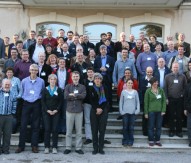
PROFILE: Bioengineering at UMass Dartmouth
The University of Massachusetts’ Department of Bioengineering on biomanufacturing and its benefits.
The Department of Bioengineering’s research group at the University of Massachusetts, Dartmouth, concentrates on the biomanufacturing of value added products from naturally occurring carbon feedstocks. Sustainable, bio-based chemicals and materials are becoming increasingly sought after in many spheres of human activity. Many compounds that were originally produced by industrial chemical methods can now be produced by micro-organisms.
The discipline of metabolic engineering allows us to construct and optimise metabolic pathways for the synthesis of numerous products from surplus or waste carbon feedstocks. The research group uses the bacterium Ralstonia eutropha (also known as Cupriavidus necator) and other industrially relevant species to produce materials like bioplastics from plant oils and carbon-containing waste streams, and can design metabolic pathways that allow the bacterium to produce compounds like biofuels and fine chemicals (succinate, 2, 3-propanediol, etc.). Metabolic engineering principles are then applied to optimise the productivity of the engineered organism at a bench scale. The synthesis process is then scaled up using fundamental bioengineering principles to develop a production process and measure its productivity. The understanding of the metabolism of organisms like R eutropha in Nature can help us rationally design a production strain with high productivity in mind.
Current projects which the group is focusing on include the production of polyhydroxyalkanoate (PHA) bioplastic using seafood waste streams as carbon sources. In particular, the degradation of waste chitin from shrimp, lobster, and crab shells and the subsequent use of the carbon feedstock for PHA production is being explored and optimised. The chitin feedstock will also be explored for the production of short chain biofuels using engineered R eutropha.
Drawing on the Bioengineering Department’s strengths of bioreactor design and biofuels production, the group are working towards establishing a production platform of biopolymers and drop-in biofuels concomitant with valorisation of locally produced waste streams. We are also examining PHA recovery using protein-protein interactions to remove intact inclusion bodies from lysed cells and purify them in vivo. This will allow the examination of metabolic activity surrounding the inclusion body, or granule, given that the proteins associated will still be attached to the polymer surface upon isolation. The milligram-scale recovery of PHA copolymers using non-halogenated solvents for thermal and mechanical testing is also being examined. The end result of this process will be to develop a process for biosynthesis of polymer that will be converted into medical devices like sutures and meshes.
The Bioengineering Department at UMass Dartmouth is the first and only bioengineering department in the University of Massachusetts system. The goal of the Bioengineering Department is to provide undergraduate engineering students with a first class education in order to provide the skills necessary for employment in the fields of biotechnology, biomedical engineering, or biomanufacturing.
Bioengineering is a topic that touches upon subjects in many disciplines. The faculty aims to provide a multidisciplinary education, along with research opportunities in novel and exciting areas of biotechnology, to ensure the marketability of students upon graduation. Research being performed in the department includes tissue regeneration, prosthesis, biomanufacturing, bioreactor design, bio-based textiles applications, and medical device engineering. UMass Dartmouth Bioengineering is working closely with local industry and novel ‘development engine’ facilities, including the Massachusetts Accelerator for Biomanufacturing (MAB), located in Fall River, MA, USA. These opportunities provide a unique and functional environment for students, academic researchers, and companies to work together to develop the next generation of bioproducts. With fresh opportunities, including those from the Horizon 2020 project, the international and domestic collaborations will further our tradition of world class research and learning at UMass Dartmouth.
Professor Christopher Brigham
University of Massachusetts
tel: +1 508 999 9139






